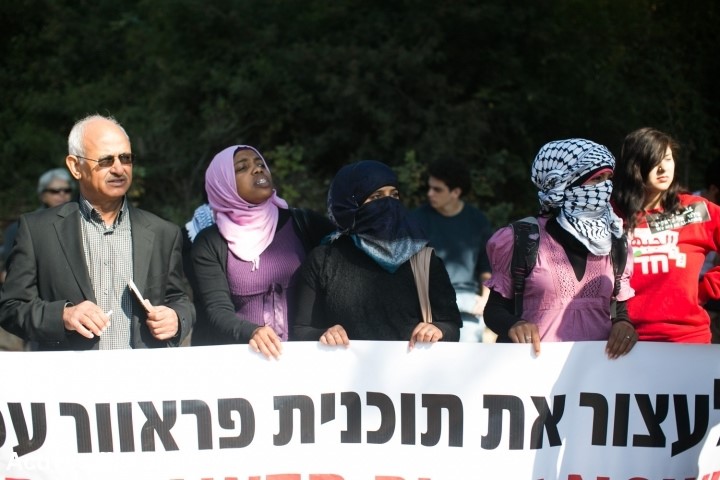Residents of the Negev Arab-Bedouin village Umm al-Hiran, whom the state intends to evict to make way for a new Jewish community on the land they’ve been living on since 1956, go before the Supreme Court on Wednesday in a bid to block the state’s plans. The Israeli government authorized construction plans for two new settlements in the southern Negev region, one of which is slated to be established on territory currently inhabited by a number of “unrecognized” Bedouin communities. Several Bedouin villagers, Hadash members and environmental activists gathered outside the Supreme Court and the Knesset in Jerusalem in order to protest the expected displacement of the residents of Umm al-Hiran.

Several Arab-Bedouins who live in the Negev desert and Hadash activists demonstrated in front of the Knesset – the Israeli Parliament – and the Supreme Court in Jerusalem against the Prawer-Begin plan and the eviction from Umm al-Hiran on November 20, 2013 (Photo: Activestills)
Hiran, which is set to be erected at the site of the unrecognized Bedouin villages of Umm al-Hiran and Atir, will initially include 2,500 housing units, and its future population will comprise a religious community as well as several secular families, “Haaretz” reported. The report said that the city of Kassif is expected to include about 12,000 housing units and will be settled mainly by ultra-Orthodox families.
The appeal seeks to overturn a district court decision ordering the evacuation of all homes in the village in order to pave the way for their demolition and the establishment of a new Jewish village named “Hiran” on their ruins. If the court accepts the motion to appeal, it will reopen the legal case; and if it rejects the appeal, it will mark the end of the road for the legal defense of Umm al-Hiran-Atir, home to 1000 Arab Bedouin citizens of the state and facilitate the demolition of the village.
The village of Umm al-Hiran was established by order of the military governor in 1956 after the Israeli army forcibly displaced its residents from their homes in the area of Wadi Zubaleh. The villagers, who are citizens of Israel, were given 7,000 dunams of land to live on and cultivate. In 2003, the state began its attempts to evacuate the villagers by issuing evacuation lawsuits and ex parte demolition orders against them, using these two separate legal procedures.
In 2011, the Beer Sheva Magistrates’ Court approved home demolition orders and Adalah appealed to the Beer Sheva District Court against the decision. Several cases remain pending. During its deliberations on the evacuations case, the District Court held that the people of Umm al-Hiran were not “trespassers”, rejecting the state’s arguments, and that they had been transferred to their current location in 1956 with the state’s agreement. However, the court also held that since the state had not given them the land for free, it had the right to cancel the agreement and reclaim the land.
The fact that the case is pending before the Supreme Court has not prevented the Israeli Government from issuing a decision to expedite the planning process for the establishment of a new Jewish town – “Hiran” – which it expects to be completed by the end of 2013. A group of Jewish citizens have established a temporary, gated, caravan community in a forest adjacent to Umm al-Hiran and are waiting for the state to demolish the villagers’ homes, paving the way for them to move to Hiran.
Related:
Hadash MK calls proposed legislation on Arab-Bedouins in the Negev a transfer plan
UN criticizes “Prawer Bill” to expel Arab-Bedouin from their land
Demonstrators march in Tel Aviv against Prawer Plan
Two years since Prawer Plan
Cabinet approves eviction of Arab-Bedouin citizens


